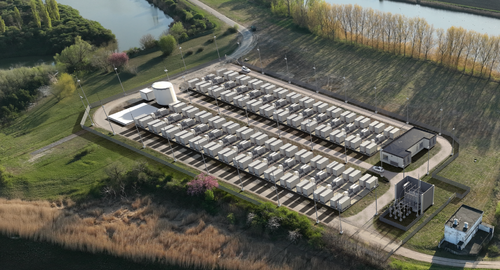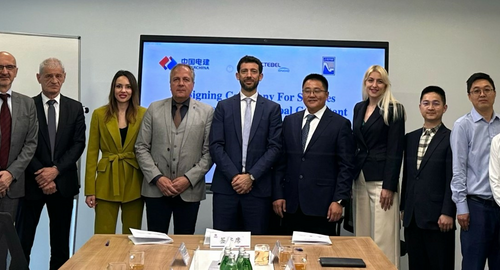
Listen to Engineering Angles, Tractebel's podcast!
In the latest episode of Engineering Angles, we caught up with Neha Bansal, Deputy General Manager of Hydropower & Water Resources in Business Development &...
Find out moreThe Executive Master in Resilient and Carbon Neutral Cities is a programme that addresses the pressing challenge of climate change, focusing on transforming cities into sustainable, resilient and carbon neutral spaces. Charles-Edouard Delpierre, Chief Officer Infrastructures Europe Tractebel and Didier Vancutsem, professor at ULB, share their motivations, challenges and objectives of this common programme. Let's explore their ideas!
What were the main reasons that motivated ULB and Tractebel to create this master's program, and how did the process of developing it unfold?
D. Vantcutsem: In general point of view, we are facing in Europe and worldwide an important climate crisis, putting our humanity at stake, and where cities have to take the lead. If we want to become climate neutral by 2030 for 100 EU cities or 2050 for the European continent, cities need to take action now. However, cities are not prepared for this transformation, and educated people are not sufficiently available on the market. At university level, there are no similar education program worldwide - we are the first to offer this Master qualification: this is a Novum. And it is the responsibility of universities to educate people and create new talents, in order to make this carbon-neutral transformation happen. The cooperation agreement between ULB and Tractebel ENGIE was the perfect basis for launching this process.
CE. Delpierre: For several years now, we have been studying the evolution of the urban landscape, particularly for the ENGIE Group. Today, cities concentrate 50% of the world's population, 75% of the energy consumed and 80% of greenhouse gas emissions. Faced with this observation, which we have detailed in a dedicated study (Cities 2030), we have noted the need for territorial decision-makers to be supported in anticipating challenges such as climate change. We need to adapt to climate change, both in Europe and globally. In the case of cities, we need to work at different scales, including buildings, districts, and city and regional scales. Faced with the magnitude of the needs, we need qualified professionals and for the time being, no course of study really covers the need for resilience and carbon neutrality in cities.
How did each organization contribute to the co-construction of the program?
CE. Delpierre: As Tractebel, a company of ENGIE, we collaborated with ULB in the scientific preparation of the Executive Master modules. Furthermore, we also shared some lectures with our experts, showcasing concrete examples of how to adapt to climate change in the energy and urban infrastructure sectors. Fostering stronger and long-term partnerships with prestigious universities such as ULB is a key pillar of our academic partnerships program. The program aligns with our mission to create a more sustainable world through innovation and expertise.
D.Vantcutsem: ULB was responsible for developing a balanced and innovative curriculum representing the current state-of-the-art in carbon neutrality and urban resilience. The university ensured the right timing for the start of the program and believed in the right approach and convictions.
What are the key objectives of the program, and how will it prepare students for their future careers?
D.Vantcutsem: The program is aiming to educate and sensibilise professionals and graduated students to the transformation of cities into resilience and carbon-neutrality, it cannot cover the full in depth dimension of carbon-neutrality as it is an Executive Master for long life education with 30 ECTS only or 60 study hours during one year, which can be easily done online and in the evening.
The program objectives are much more focussing on an upgrading and awareness rising on those central questions, and how students can be motivated to engage in the crucial transformation processes of cities: it was very interesting to see the great diversity of topics developed as Master Thesis by the students! Several graduated students received after their successful Master a job update or a new job responsibility as carbon-neutrality expert, which can be considered a a great achievement of this Executive Master.
CE. Delpierre: As mentionned above, we need to work at different scales (buildings, districts, city-and regional scale) and in a multidisciplinary way - what we call ‘integrated offers’. This unique Executive Master program helps students be more prepared for climate change at buildings, city, and regional scales, which are often overlooked. It is also a way to consider both public and private stakeholders together.

About ULB (Université Libre de Bruxelles)
As a multicultural university with one third of students and researchers from abroad, the Free Brussels University has 12 faculties that cover all the disciplines, closely combining academic input and research. It offers almost 40 undergraduate programmes and 250 graduate programmes (among them 23 Master Programmes fully taught in English). It also partners 20 Doctoral schools, with almost 1,600 PhD in progress. One of the University's main aims is to give its students a solid foundation in critical thinking as well as a taste for research, while at the same time catering to the needs of new publics. Its outward-looking position with regard to Europe and the world has resulted in a number of agreements, collaborations and special partnerships being set up with some of the world's top universities. Its Faculty of Architecture La Cambre Horta with nearly 1.800 students and more than 120 teachers coordinates several Bachelor and Master programmes in Architecture, Landscape Architecture and Urban Planning.

In the latest episode of Engineering Angles, we caught up with Neha Bansal, Deputy General Manager of Hydropower & Water Resources in Business Development &...
Find out more
Tractebel helps ENGIE build its second large-scale battery park in Belgium, contributing to shaping a flexible, reliable and sustainable energy system in the country.
Find out more
Our Urban teams from France and Monaco are leading the design and construction supervision of the Mediterranean Pavilion, ahead of the third United Nations Ocean...
Find out more
Our transport infrastructure experts signed a mandate on April 25, 2025, to provide technical services on the first metro project in the Western Balkans. This is our...
Find out more